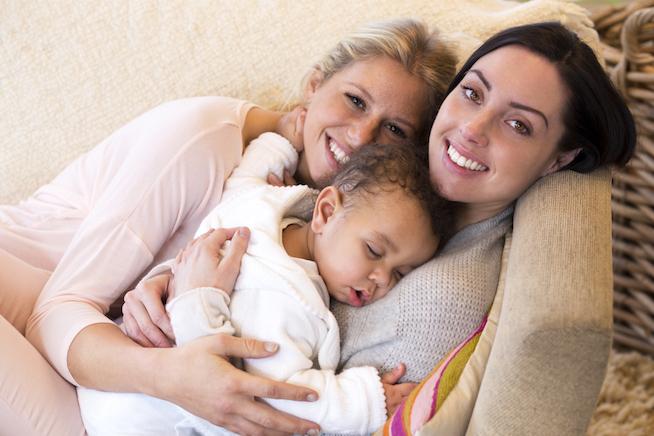
Think about it.
Our kid does not have a dad. I’m not answering questions about a role that does not exist, and I’m certainly not going to do that to save straight people a moment of discomfort.
One thing about being a queer person with a kid, is that you find yourself constantly coming out. As a relatively femme presenting queer lady, I was already coming out a lot, but having a baby definitely increases the frequency. People see a baby and immediately imagine that the kid must have a mother and father, who are probably married, who made that baby with good ol’ fashioned P-in-V sexual intercourse, most likely in the missionary position.
It’s a stupid assumption, but it’s one I get to correct a lot nowadays.
Something has been on my mind, and it’s about the things we don’t say.
See, yesterday, my wife and I took our kid to the doctor. It was nothing major, but we are switching pediatricians and needed to meet the new one, and also he’s had the sniffles and such. So we go through the process like normal. We wait in the waiting room. We get called back. The nurse takes him to weigh him. And then she turns to us, my wife and I. We’d all been chatting amicably the whole time about things like how freaking beautiful this baby is (oh, we know) and also how freaking huge (know that, too).
“So which one of you is mom?”
“Oh, we both are,” I said it as quickly and naturally as I could, even though that question still makes my ears ring every time. (I wonder if that will ever stop?)
Then there was a silence, and my wife offered additional the information, “But she’s the birth mom. She gave birth to him.”
“Oh, OK!” the nurse said. And then it was over, back to the usual queries of “My gosh, what do you feed him?”
I found myself wishing she had stayed quiet. Why?
She wasn’t saying anything wrong or incorrect. If the nurse was asking for medical reasons, she was probably using “Which one of you is mom?” as shorthand for “Which one of you carried him in your uterus?” Sometimes they do need that information. She was just trying to be helpful. But still I would have slightly preferred it if she had said nothing.
♦♦♦
I’m going to tell you a story.
When our child was born, I had a C-section at a very nice hospital. Everyone there was very nice and wonderful to us, and actually part of the reason we went to that particular hospital was because our midwife knew it to be a queer-friendly one. This was before legal marriage was available in our state, so being at a queer-friendly hospital was absolutely vital to our family if we had to be at a hospital, which we did. Everyone respected Chelsea’s role completely and treated us both as parents. It was lovely. Except for one part.
Right after the C-section, we were in the recovery room (which isn’t really a room at all —it’s a curtained off little area). There was a nurse there monitoring me and the bae’s vital signs and generally making sure we were OK. We got to talking. He was born with a ton of beautiful blond hair, and we were all in awe of him.
“Does the dad have blond hair?” she asked.
And there it was, hanging in the air. In my drugged state, I wasn’t totally sure how to respond. I let the silence stretch a little and then I said, “The dad?” like I had no idea whatsoever what she meant and it was the weirdest least expected question in the world.
Silence.
“Oh, I mean the father.”
Silence.
“The biological father.”
Silence.
“The donor?”
“Oh!” I said, “No. His donor has brown hair.”
♦♦♦
We laughed about it afterward. The tone-deaf question — the one we were dreading — followed by an off-the-cuff response that turned out to be the most perfect one possible.
The least respectful comment I have gotten (at least directly and in person), as a queer parent, is "Oh, you know what I mean."
But I think people should have the decency to say what they mean. Or if they don’t know how to phrase something, ask. But pretending my kid has a dad when you know damn well that both of his parents are sitting in front of you and neither of them is a dad is disrespectful. I don't care whether you do it accidentally or on purpose. Intent is not magic, and it doesn’t erase how othering it feels to have people insist upon talking about your family in terms that are not accurate. And one day our child will speak English and it will be him feeling othered too.
And so, I like to let the silence linger.
By waiting it out, by not jumping in with more information, I forced her to think about her word choices and ask the question that was actually relevant. This is not a matter of semantics. Our kid does not have a dad. I’m not answering questions about a role that does not exist, and I’m certainly not going to do that to save straight people a moment of discomfort.
♦♦♦
Our child has two moms.
Maybe the nurse the other day was asking for medical purposes, but maybe she wasn’t. If we were a straight couple, and he was adopted, would I need to answer “I’m his mom, but he’s adopted” every time someone asked? 'Mom' refers to a social role within a family, and so I prefer to use it as such. I’m his mom, and Chelsea is too. She may have just assumed one of us was an aunt and wanted to know who it would be appropriate to hand the baby back to after weighing him.
Who is mom? Oh, we both are. Full stop.
If you want to know more than that, you are going to have to ask. You are going to have to sit with that silence a minute and think about what you are actually asking and why you need to know.
This post first appeared at Post Nuclear Era.




